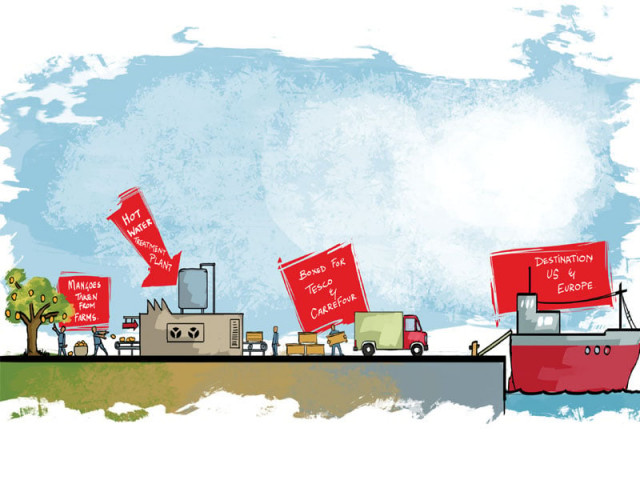Fountain of youth: Technological progress boosts demand for mangoes
Hot water treatment facility opens up new export markets for Pakistan.

Fountain of youth: Technological progress boosts demand for mangoes
The establishment of Karachi’s hot water treatment (HWT) plant – a facility for post-harvest treatment and processing of fruits and vegetables – is a very good example of how the country’s agriculture sector can benefit by investing in technological advancements. It is because of this technology that Pakistan has been able to venture into some of the world’s largest markets for its mango over the past couple of months.
In order to expand mango exports, Durrani Associates, one of Pakistan’s largest mango exporters, in partnership with the government, set up the Rs220 million HWT plant, which is officially known as Pakistan Horti Fresh Processing (Pvt) Limited. This investment, according to Durrani Associates’ Director Babar Khan Durrani, can be recovered within five years.
Durrani told The Express Tribune that they were already exporting mangoes to Tesco in the United Kingdom and Carrefour in the rest of Europe – two of the world’s largest retail chains – but HWT facility has opened new markets for the exporters. The exporters can use the facility and ship their products via sea now, which will enable them to sell at competitive prices.
HWT increases shelf life of mangoes to 35 days, thus they can now be shipped by sea to remote destinations, a major development, which reduces freight charges to a great extent.
Take the example of China, Durrani said, where air freight alone costs more than $1.25 per kg of mangoes. The processed mangoes can be shipped by sea, he said, bringing the cost down to $0.20 per kg. As a result, the Pakistani exporter was able to impress Walmart China, which, in a week’s time, will strike a contract for supply of another 100 tons of mangoes.
The UK and South Korea, according to Durrani, are two other markets that will benefit Pakistan in sea shipments. Freight cost of mango exports to the UK, which stands at Rs137 per kg, will come down to Rs12 per kg while in Korea, where duty on air trade is 30%, delivery by sea is duty free.
Talking about how this technology has helped expand mango exports, Durrani said fruits and vegetables processed by HWT facility meet requirements of the United States Department of Agriculture (USDA), World Health Organisation (WHO) and International Quarantine Standards, thus making them globally acceptable.
In the past, Pakistan’s mangoes were denied access to several key markets including the US and China because of nine diseases. HWT kills anthicolas, a major disease that results in black spots on mango skin.
“The skin of our mango is rough but its taste is very good,” company’s Chairman Abdul Qadir Khan Durrani said. “HWT improves the skin while killing all diseases after treating at 50 degrees for an hour,” he added.
He claimed Pakistan has world’s largest HWT plant having capacity to treat 15 tons of mangoes per hour. The second largest plant is in Mexico that treats 4.5 tons of mangoes per hour, he said.
Besides the $2,200 per ton market of Europe, the $1,600 per ton market of China could prove to be the largest importer of Pakistan’s mangoes, Durrani said.
Following the establishment of HWT plant some two months ago, Pakistan has added China, South Korea, Australia, Lebanon and Mauritius to its mango markets. Pakistan, according to Durrani, is the 5th largest producer of mangoes, producing 1.6 million to 2 million tons.
By contrast, the mango exports are 8% of the production or less than 50% of the export potential, a strong indication that there is still a huge space for more investment on the technology front. “We need more than 10 such plants for meeting mango demand of North American markets,” Director Durrani said.
“Our agriculture sector lacks technology. People shy away from using technology.” It will take a while before all farmers adopt new technologies, he said.
With the establishment of HWT facility, mango exports could increase from the current 150,000 tons to 350,000 tons in the next five years, according to experts. However, there is much more agriculture can achieve through establishing such plants.
“About 30% to 40% of our fruits and vegetables are wasted because they are not processed,” Durrani said. “Given the HWT plant can process almost every fruit and vegetable that we produce, we can save our produce from being wasted,” he added.
Published in The Express Tribune, August 23rd, 2012.


















COMMENTS
Comments are moderated and generally will be posted if they are on-topic and not abusive.
For more information, please see our Comments FAQ